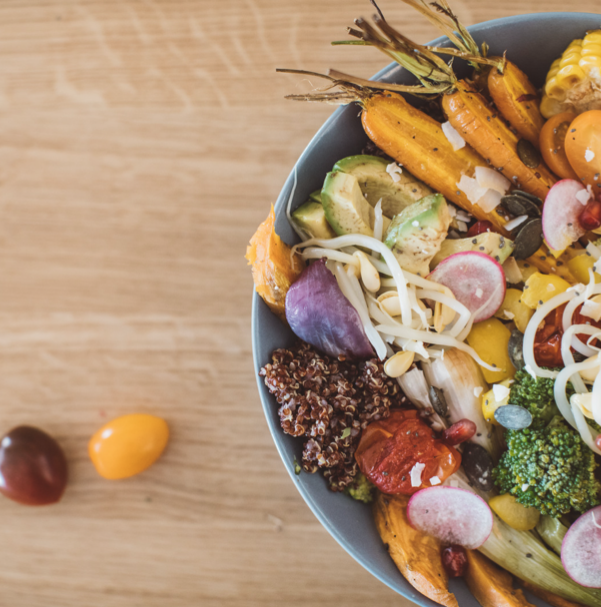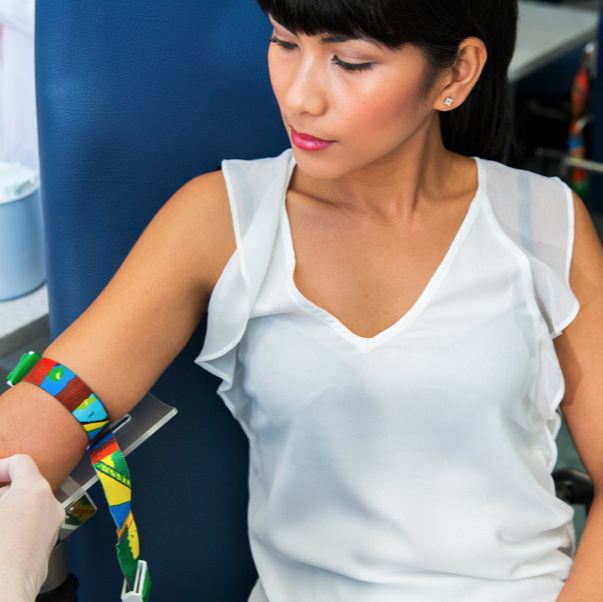- Fast results
- 4,000+ locations
- 4.8 star rating
Need Help? (888) GET LABS



Vegan diets or, as others preferred to call them, complete plant-based diets have become a common trend for health and social reasons.
Although a small portion of the US population labels themselves as vegan, the number of people who consciously choose vegan foods continues to grow.
In 2020, interest in veganism was at its all-time high, as reported by The Economist.
Indeed, vegan diets have plenty of benefits for your health and wellness. It is popular among people who try to lose weight.
However, like any other health change, you may undergo some challenges once you switch to a vegan or plant-based diet.
Your body could experience adverse effects, especially if you have an underlying condition that has not been uncovered prior to changing your diet.
Nonetheless, knowing these potential health risks can help you switch to a vegan diet without causing harm to your body.
Find out what disorders or diseases vegans are prone to and how you can effectively avoid them altogether.

A vegan diet excludes meat and animal products focusing solely on plant-based foods. It strictly follows veganism in which animal-based items are eliminated from the lifestyle, including clothing and household items.
Foods that are often on a vegan’s grocery list are:
Foods to avoid:
A vegan diet is different from a vegetarian diet since the latter does not contain any animal meat, but it still includes products derived from animals like eggs, milk, cheese, yogurt, and more. Whereas in a vegan diet, these products are completely restricted.
One of the major appeals of a vegan diet is its wide array of health benefits. Aside from the movement against animal cruelty and promoting sustainability, many people associate veganism with a healthier lifestyle. Here are some of the significant advantages you can gain once you switch to a vegan diet.

As promising as the health benefits of a vegan diet are, it is not without any drawbacks.
Here are some of the known conditions a vegan diet can induce if you fail to monitor your health or carefully plan your food intake.
Let’s begin with a prevalent nutrient shortage among vegans and vegetarians: vitamin B12 deficiency.
Vitamin B12 is commonly found in red meat, eggs, fish, and milk – all of which are prohibited in a vegan diet. It is a critical factor in normal brain function, red blood cells (RBC) production, formation of enzymes, and cellular growth.
As you read along, you’ll find out that most health conditions developed by vegans are related to vitamin B12 deficiency.
Without the familiar sources of vitamin B12, certain bodily functions can be disrupted, leading to anemia, gastritis, stroke, Crohn’s disease, and Celiac disease.
Naturally, the best thing to do if you turn to plant-based diets is to guarantee the inclusion of sufficient vitamin B sources that are vegan-friendly.
Foods fortified with vitamin B12 are available in the market, like soy and plant milk products. Additionally, you can also get vitamin B12 from shiitake mushrooms and seaweeds.
Surprisingly, vegans are still prone to developing stroke considering the diet itself could prevent heart disease.
However, the results of an 18-year study by EPIC-OXFORD on the health impacts of different dietary patterns suggested that plant-based diets could increase the risks for stroke by 20%.
Naturally, since cholesterol is lowered among vegans and vegetarians, it is unlikely that fat intake is the culprit. Instead, researchers associate the prevalence of stroke with vitamin B12 deficiency, which is common among non-meat eaters.
Vitamin B12 plays a crucial role in cellular growth and other biological activities. It reduces homocysteine in the blood. Homocysteine is an amino acid linked to the development of blood clots that lead to stroke.
Aside from ensuring enough vitamin B12 sources in your vegan diet, monitor the vitamin level in your blood, especially if you’re already far along in your vegan lifestyle.
Consult your doctor about your risks for stroke and get the Vitamin B12 Blood Test for safe measures.
It’s all in the blood. This time it’s literal for vegans as anemia is a potential health risk that comes with a completely plant-based diet.
Anemia is a condition wherein you fail to produce healthy RBCs that distribute oxygen across your body. The lack of oxygen can cause disruptions in organ functions.
There are two common ways a vegan can develop anemia.
The first one is through iron deficiency. Iron is an essential mineral in the formation of RBCs. Without enough iron, RBCs decline in numbers leading to iron-deficiency anemia.
The second one is due to a lack of adequate vitamin B12 and folate. Just like iron, these vitamins are prerequisites for the production of healthy RBCs.
The deficiencies can lead to the formation of abnormal RBCs with irregular shapes or sizes. These malformations are associated with megaloblastic anemias, which also reduces the efficiency of oxygen delivery.
Check for symptoms of anemia such as:
Also, do not attempt to start a plant-based diet if anemia was detected via a blood test. Consult your doctor or nutritionist first.
For decades, doctors and medical professionals have grown cynical on the clinical basis of the leaky gut syndrome.
However, recent studies supported the implications of leaky gut to several health conditions.
Leaky gut syndrome or intestinal hyperpermeability occurs when the tight openings in the intestinal barriers are loosened. This allows nonessential or even toxic particles to enter the bloodstream.
While the direct cause of leaky gut is yet to be identified, illnesses like Crohn’s disease and Celiac disease are associated with increased intestinal permeability. Therefore, a critical influence in the development of this condition is diet.
Plant-based diets largely consider legumes like lentils, peanuts, and soybeans as primary protein sources in place of meat.
Legumes contain compounds known as antinutrients. These compounds decrease the body’s capacity to absorb essential nutrients. Some of which contribute to the likelihood of intestinal hyperpermeability, such as lectins and phytates. These antinutrients disrupt the gut microflora and induce inflammation.
Although more research is needed to understand leaky gut syndrome completely, one practical way to protect yourself is to detect underlying conditions related to LGS like Celiac disease.
The initial challenge in switching to a vegan diet is ensuring that the nutrients you get from animal products are still supplied through plant substitutes.
Many of those who have turned vegan cold turkey suffered from a nutrient deficiency that affected not only their physical health but their mental health as well.
Mood alterations are influenced by shortages in brain chemicals like serotonin, dopamine, and norepinephrine.
The nutrients from your diet play critical roles in the formation of these neurotransmitters. These include omega-3 fatty acids, folates, vitamin B12, zinc, calcium, iodine, and iron.
The absence of meat in plant-based diets that usually supply these macromolecules can trigger symptoms of depression.
To avoid any adverse effects of a vegan diet on your mental health, plan your meals carefully and make sure that you have enough sources of nutrients that affect brain activities.
Another regular source of protein in vegan diets is soy products like soymilk, tofu, tempeh, and soy nuts.
While soy has lower calories, high fiber, and low fat, it is also rich in phytoestrogens. These are compounds naturally found in plants and function similarly to animal estrogens.
In humans, estrogen is responsible for developing female secondary characteristics such as the development of the breast and menstrual cycle regulation. Among males, it plays a role in the maturation of the sperm cell.
One known side effect of phytoestrogen is the disruption of hormone levels. Once taken in large quantities, they become endocrine disruptors harming your normal body functions.
When planning your vegan meals, make sure that you don’t simply rely on soy products as the sole source of your protein. Instead, diversify your meals to avoid overconsumption of soy or other foods.
Despite evidence of the potential health risks of plant-based diets, it is clear that the good outweighs the bad.
Vegan and vegetarian diets still account for plenty of weight loss success.
Furthermore, it holds a lot more health benefits that could increase your longevity.
But how do you avoid the potential adverse effects of a vegan diet?
Simple, just make sure you follow these actions before completely switching your nutritional pattern.

Going vegan without consulting your doctor is a common rookie mistake. Unfortunately, just because it’s trending doesn’t mean it’s for everyone.
You may have underlying conditions that your diet switch could aggravate.
Get the approval of your doctor before starting your new diet.

If autoimmune diseases, Celiac disease, and stroke run in your family, get tested and know your risks.
Also, make sure you get your baseline data to monitor health changes, both positive and negative when you embrace veganism.
Get the Basic Vegan/ Vegetarian Profile Blood Test. It covers all the necessary blood tests for people who have plant-based diets.

There’s no need for you to completely eliminate all meat products if it means that your health will suffer. Instead, start by increasing the ratio of plant-based foods or eliminating certain meats.
Consider going pescatarian first, wherein you simply drop all red meat and poultry but retain fish and seafood.

Without people around you who share the same view, goals, and experience, going vegan or vegetarian can be tricky. The adjustment process will be a lot smoother if you have support from a vegan community.

Switching to vegan diets has plenty of health benefits. But all these benefits can be eclipsed by severe adverse effects if you don’t consider your current health first.
For some people, going vegan is impractical because of their existing health problems. Nonetheless, it doesn’t mean that there are no other alternatives to a plant-based diet in which you still get the same output you want.
The best thing to do before changing to a vegan diet is to check with your doctor. Understand your body first to avoid unwanted consequences in the long run.

© Copyright 2025 Personalabs. All Rights Reserved.